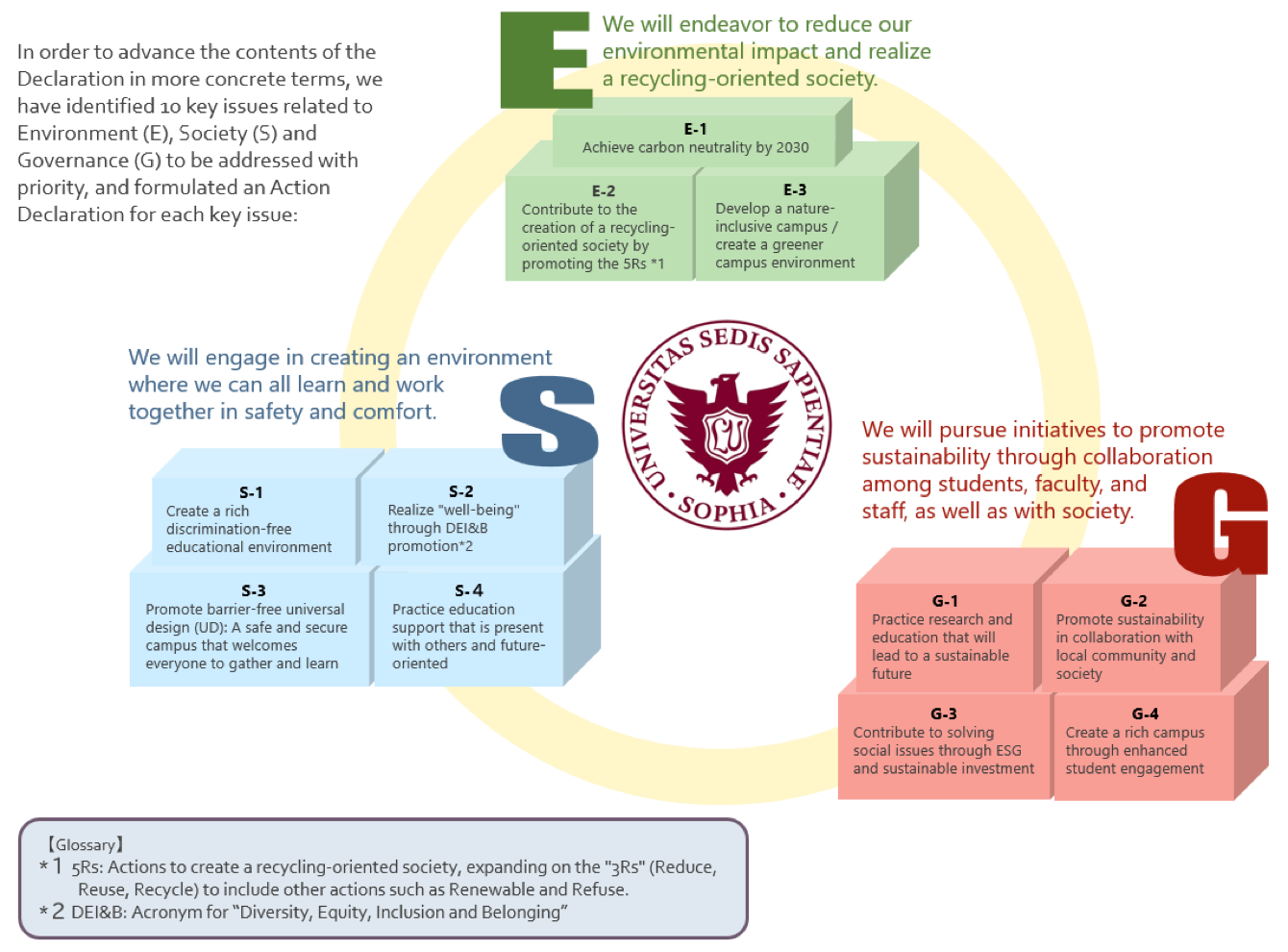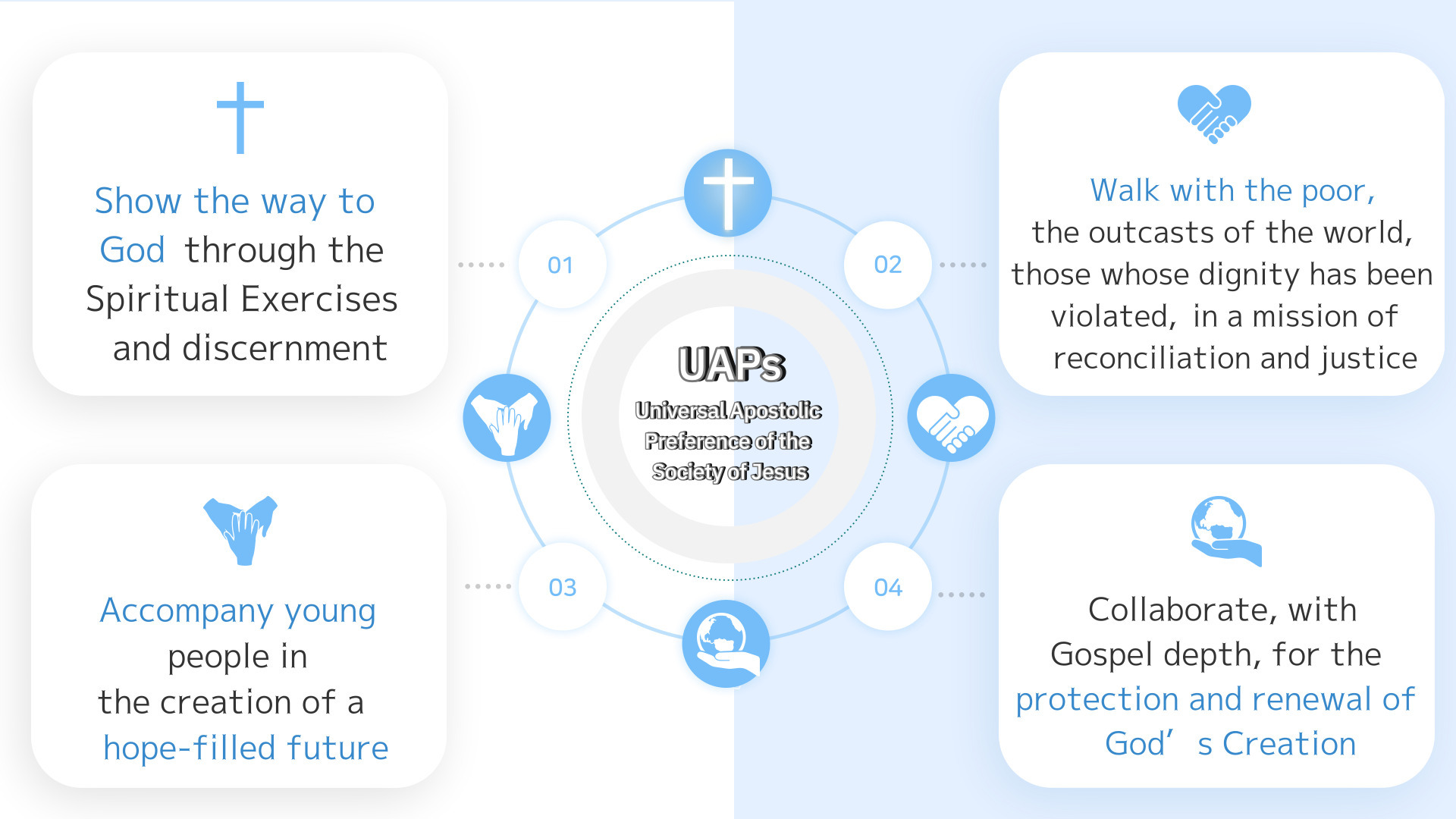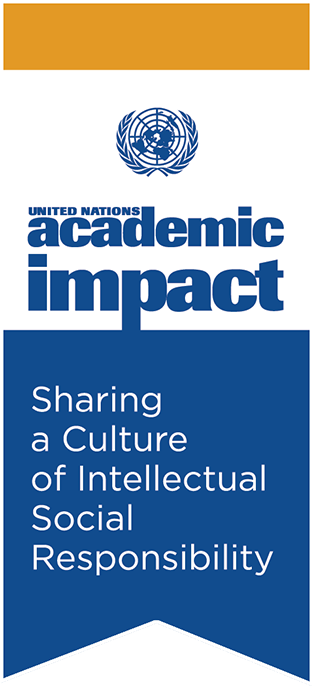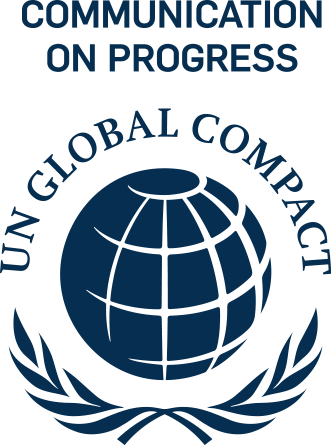SDGs at Sophia University
Sophia School Corporation Declaration on Promoting Sustainability
Sophia School Corporation has been committed to human education based on “Christian Humanism”, where each student, faculty and staff mutually recognizes the dignity of the human personality and basic human rights, and aims to be a person who serves the development of the world with responsible behavior and a humble spirit. Never taking a bystander attitude, each school is committed to nurturing individuals who strive to solve global-scale problems through dialogue.
When Pope Francis visited Sophia University in 2015, he delivered the message that in the spirit of his encyclical, Laudato Si’, “this university should be a center not only of intellectual formation, but also a place where a better society and a more hope-filled future can take shape” and that“ love for nature should here find expression in a sapient and foresighted concern for the protection of the earth, our common home.” Committed to the educational spirit of“ For Others, With Others” and the seven goals presented in Laudato Si’, Sophia School Corporation will contribute to solving social issues, creating value, and protecting and preserving the environment through its research and education activities.
Sophia University has signed its commitment to Pope Francis’ “7-Year Journey Towards Integral Ecology”. In order to achieve the goals of Laudato Si’, members of signatory universities are expected to learn, practice, and share, with the broad participation of students, faculty, staff, and all relevant stakeholders.

*UAPs
The Society of Jesus, which established Sophia School Corporation, set out at the General Congregation 32 in 1975 set out the “promotion of faith” as a service of faith. Then, the Jesuit General Congregation 35 in 2008 focused on environmental destruction, as well as refugee and migrant issues, which had emerged as an aspect of the shadows of globalization. As a result, it stressed the importance and urgency of “reconciliation,” and highlighted ”reconciliation with God,” “reconciliation with one another,” and “reconciliation with creation.” In 2019, apostolic priorities were outlined in the Universal Apostolic Preferences of the Society of Jesus (UAP):
- To show the way to God through the Spiritual Exercises and discernment;
- To walk with the poor, the outcasts of the world, those whose dignity has been violated, in a mission of reconciliation and justice;
- To accompany young people in the creation of a hope-filled future;
- To collaborate in the care of our Common Home.
These preferences are consistent with Sophia School Corporation’s promotion of sustainability, as well as with the SDGs.

United Nations and Sophia University SDGs
Sophia University United Nations Weeks

As an institution of higher education participating in the United Nations Academic Impact initiative, Sophia University organizes "Sophia University United Nations Weeks," which started in Academic Year 2014, every year in early June and late October, around United Nations Day (October 24).
With the concept "To consider our world and the future through U.N activities," various events and Initiatives are held including international symposia, lectures, photo exhibitions and movie shows.
These events and Initiatives are opened to our students as well as to the public and every time we have a large audience of working people and high school students. Since Academic Year 2016, we have put great efforts into holding lectures and symposia on SDGs.
United Nations Global Compact

The United Nations Global Compact (hereafter UNGC) was announced by then UN Secretary-General Kofi Annan in an address to the World Economic Forum in 1999, and was officially launched at UN Headquarters in New York City on 26 July 2000. It is an international framework under which business sectors and non-business organizations are expected to take responsible and creative leads for the society toward the sustainable development.
At present more than 13800 entities in 161 countries and regions have signed up for UNGC and conducting the Ten Principles in the areas of human rights, labor, the environment and anti-corruption, and striving after the SDGs.
Sophia University became a signatory member of UNGC in May 2015 and also affiliated with the Global Comact Network Japan (GCNJ), the local area network. Since then Sophia has been jointly hosting a series of symposiums with GCNJ during the UN Weeks in collaboration with the member companies and UN organizations.
| Human Rights | Principle 1: Businesses should support and respect the protection of internationally proclaimed human rights Principle 2: make sure that they are not complicit in human rights abuses |
|---|---|
| Labour | Principle 3: Businesses should uphold the freedom of association and the effective recognition of the right to collective bargaining Principle 4: the elimination of all forms of forced and compulsory labour Principle 5: the effective abolition of child labour Principle 6: the elimination of discrimination in respect of employment and occupation |
| Environment | Principle 7: Businesses should support a precautionary approach to environmental challenges Principle 8: undertake initiatives to promote greater environmental responsibility Principle 9: encourage the development and diffusion of environmentally friendly technologies |
| Anti-Corruption | Principle 10: Businesses should work against corruption in all its forms, including extortion and bribery |
| United Nations Global Compact | https://www.unglobalcompact.org/ |
| Sophia University COE (February 2022) | https://unglobalcompact.org/participation/report/cop/detail/480857 |
| Global Compact Network Japan (in Japanese) | http://www.ungcjn.org/ |
United Nation's Principles for Responsible Investment (PRI)

Sophia School Corporation signed the United Nation's Principles for Responsible Investment (PRI) in November 2015 in order to implement the principles of UN Global Compact in our investment management practice. PRI's mission is that all investors incorporate ESG issues into investment analysis and decision-making processes for realization of a sustainable society. By signing the PRI, we incorporate ESG issues into our investment policy consistent with Sophia University's founding philosophy. As a school corporation and a responsible asset owner, we are committing to contribution towards the global sustainability issues all of us face through ESG investment.
Sophia School Corporation's ESG Initiatives
https://www.sophia-sc.jp/en/esg.html
